Allied Health Professionals
Allied health professionals (AHPs) form part of the secondary care team and play a vital role in diagnosing, treating, and rehabilitating patients to improve their quality of life. This diverse group of healthcare experts works across various settings, including hospitals, clinics, community centres, schools, and even patients’ homes. AHPs bridge the gap between clinical care and holistic patient support, contributing to physical, mental, and emotional well-being.

Whether you’re interested in direct patient interaction, scientific exploration, or innovative therapeutic practices, AHP careers are both rewarding and varied.
Opportunities exist for individuals with a wide range of skills, from hands-on care to research and administration.
Allied Health Professional roles are ideal for those who:
Are compassionate and empathetic.
Enjoy problem-solving and creative thinking.
Value teamwork and patient-centred care.
Are you curious about where your skills might fit in this vital sector?
Click on the cards below to explore specific roles and find out how you can contribute to the world of allied health professionals.
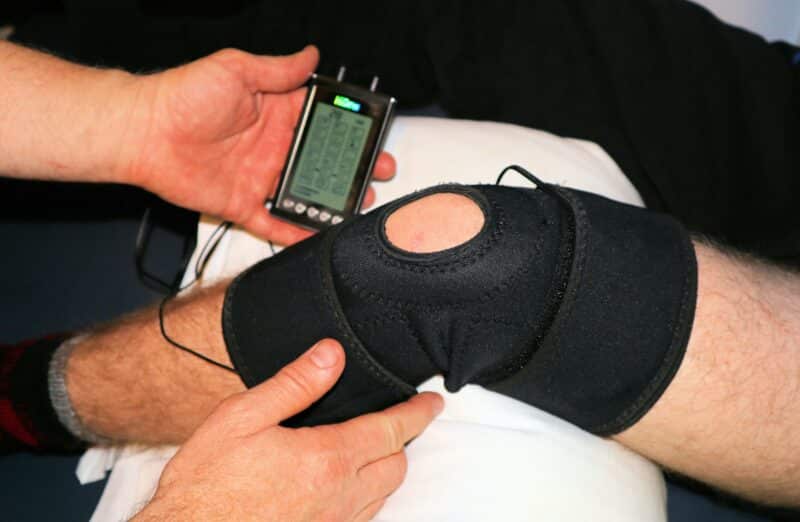
Physiotherapists
Physiotherapists specialise in helping patients recover from injuries, surgeries, or medical conditions that affect mobility and physical function. They work with people of all ages, from children with developmental delays to athletes recovering from injuries and elderly individuals managing chronic conditions. Physiotherapists use evidence-based techniques like exercise therapy, manual manipulation, and advanced technology such as ultrasound and electrotherapy to support recovery and promote independence.
These professionals often collaborate with multidisciplinary teams in hospitals, rehabilitation centres, private practices, and community clinics. Some physiotherapists also specialise in areas such as sports therapy, paediatrics, or neurology. Their goal is not just to treat symptoms but to empower patients with knowledge and tools to maintain long-term health and well-being.
Working as a physiotherapist is ideal for individuals who are passionate about improving lives through movement and therapy. This role involves assessing patients’ conditions, developing tailored treatment plans, and providing hands-on care to support recovery. Physiotherapists are also educators, teaching patients exercises and strategies to prevent future injuries.
This career requires physical stamina, excellent problem-solving skills, and empathy to build trust and rapport with patients. If you thrive in an environment where science meets compassion, physiotherapy offers a dynamic and fulfilling path. Whether working in a bustling hospital or a private practice, no two days are the same, and each brings new challenges and opportunities to make a tangible difference.

Occupational therapists
Occupational therapists (OTs) help individuals of all ages live as independently as possible by focusing on daily activities and meaningful occupations. They work with patients who face challenges due to physical disabilities, mental health conditions, or developmental delays. OTs assess the needs of their patients and provide customised interventions, from modifying a home environment to recommending adaptive tools or teaching new skills.
These professionals are employed in hospitals, schools, care homes, and community settings, often collaborating with families and other healthcare providers. Some OTs specialise in specific areas such as paediatrics, mental health, or geriatrics. By promoting independence and confidence, occupational therapists play a crucial role in helping patients achieve their personal goals and improve their quality of life.
A career in occupational therapy is perfect for those who are creative problem-solvers and empathetic listeners. OTs combine scientific knowledge with a deep understanding of human behaviour to design interventions that address each patient’s unique challenges. This might involve helping a child develop motor skills, supporting an adult returning to work after injury, or assisting an elderly person to safely navigate their home.
Strong interpersonal skills, patience, and adaptability are essential for success in this role. If you enjoy seeing the direct impact of your work on someone’s life and thrive in a collaborative environment, occupational therapy offers a deeply rewarding career path. It’s a chance to make a tangible difference in people’s lives every day.
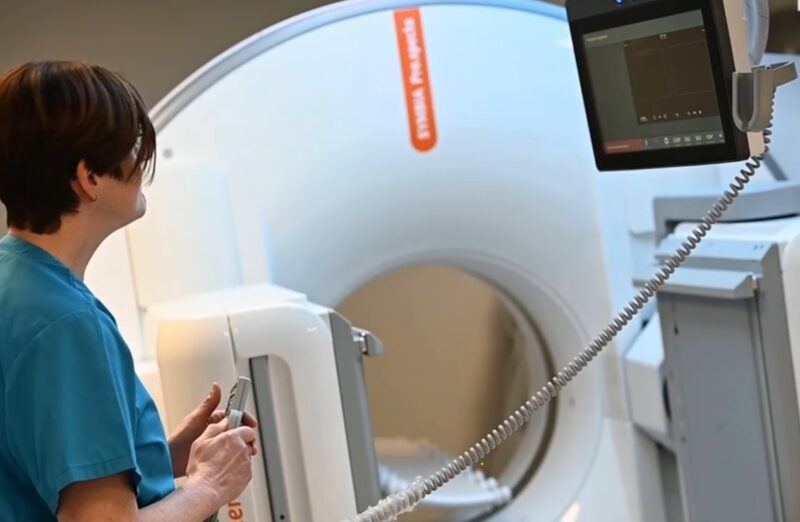
Radiographers
Radiographers are healthcare professionals who use advanced imaging technologies to diagnose and treat medical conditions. Diagnostic radiographers capture images using X-rays, MRIs, CT scans, and ultrasounds to help doctors identify issues like fractures, tumours, or internal injuries. Therapeutic radiographers, on the other hand, play a key role in cancer treatment, delivering precise radiation therapies to target malignant cells while protecting healthy tissue.
Radiographers work in hospitals, specialist imaging centres, and private clinics, often collaborating with doctors, nurses, and other healthcare staff. They must ensure patient comfort while maintaining the accuracy and safety of their procedures. This role is highly technical, requiring an in-depth understanding of anatomy, physics, and cutting-edge equipment.
If you’re detail-oriented and enjoy blending technology with patient care, a career in radiography could be a perfect fit. Radiographers are at the forefront of medical diagnostics and treatment, providing crucial insights that inform clinical decisions. The work is varied and can include anything from taking a simple X-ray to operating sophisticated imaging systems during complex surgeries.
Compassion, precision, and strong problem-solving skills are essential traits for this role. Radiographers often reassure patients who may be anxious about their procedures, requiring excellent interpersonal skills. Whether diagnosing fractures or supporting cancer treatments, radiographers make a significant impact on patient outcomes, contributing to life-saving care in fast-paced, high-stakes environments.

Dieticians
Dietitians specialise in the science of nutrition, using their expertise to help individuals manage medical conditions, improve health, and achieve better well-being. They assess patients’ dietary needs, develop tailored nutrition plans, and provide education on healthy eating habits. Dietitians play a vital role in managing conditions such as diabetes, food allergies, eating disorders, and gastrointestinal diseases, as well as supporting recovery from surgeries or illnesses.
Dietitians work across diverse settings, including hospitals, community health centres, schools, research institutions, and private practices. Some specialise in areas like paediatrics, sports nutrition, or oncology, where nutritional care is critical for treatment outcomes. Their work ensures that dietary recommendations are both practical and evidence-based, empowering patients to make informed choices about their health.
A career as a dietitian is ideal for those who enjoy combining scientific knowledge with patient-centred care. Dietitians must possess strong analytical skills to interpret medical data and a compassionate approach to motivate patients and families toward healthier lifestyles. They often work closely with other healthcare professionals, contributing to multidisciplinary care plans.
Attention to detail, excellent communication skills, and the ability to translate complex science into actionable advice are key attributes for success. Whether creating a meal plan for a child with allergies or supporting a cancer patient through treatment, dietitians make a tangible difference in improving quality of life. This career is both challenging and deeply rewarding for those passionate about nutrition and health.

Speech and language therapists
Speech and language therapists (SLTs) support individuals with communication and swallowing difficulties. These challenges may arise from developmental disorders, neurological conditions, head injuries, or illnesses such as cancer or stroke. SLTs provide assessments, develop therapy plans, and use specialised techniques to help patients overcome these issues.
SLTs work in diverse settings, including hospitals, schools, care homes, and community clinics. They assist children with speech delays, help adults regain communication skills after brain injuries, and support elderly patients with conditions like Parkinson’s disease. Some SLTs specialise in oncology, aiding patients recovering from surgeries like laryngectomies. Their work is vital in enabling patients to reconnect with their world through improved communication and independence.
This career suits empathetic, patient-focused individuals who thrive on creative problem-solving. SLTs need excellent observational and analytical skills to assess patient needs and develop tailored interventions. They also require strong interpersonal skills to collaborate with families, educators, and healthcare teams.
If you’re passionate about language, enjoy one-on-one patient interaction, and want to make a meaningful difference, this role offers a fulfilling path. SLTs often witness significant progress in their patients, making their work both challenging and deeply rewarding. Whether in paediatrics or adult care, speech and language therapy is a profession where you can transform lives every day.
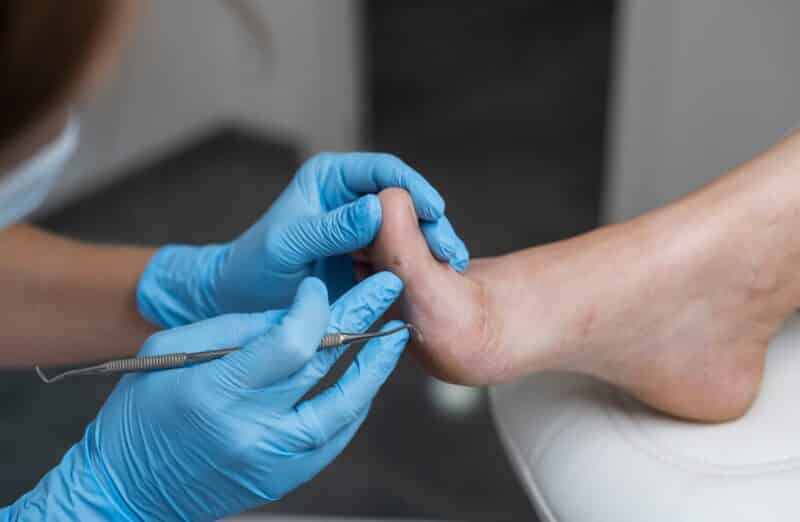
Podiatrists
Podiatrists are healthcare professionals specialising in diagnosing, treating, and preventing conditions affecting the feet, ankles, and lower limbs. Their work encompasses a wide range of issues, from routine foot care and managing minor infections to treating more complex conditions like diabetic foot ulcers or sports injuries. Podiatrists often play a vital role in detecting early signs of systemic diseases such as diabetes, arthritis, or circulatory disorders through careful foot examinations.
These professionals work in various settings, including hospitals, clinics, GP practices, private practices, and even community health centres. Some podiatrists specialise in fields like biomechanics, helping patients improve posture and mobility, or podiatric surgery, addressing more severe foot and ankle problems. Their expertise ensures that patients of all ages can maintain their independence, mobility, and overall health.
A career as a podiatrist is ideal for those with an interest in anatomy, problem-solving, and providing hands-on care. Podiatrists must combine technical skills with excellent interpersonal abilities to diagnose and treat patients effectively. They often work closely with other healthcare providers, forming a crucial part of multidisciplinary teams.
This role requires precision, patience, and empathy, as many patients may feel self-conscious or apprehensive about their conditions. For those who enjoy the satisfaction of improving mobility and preventing serious complications, podiatry offers a highly rewarding career path. Whether helping an athlete return to their sport or preventing complications in a diabetic patient, podiatrists make a tangible impact on health and well-being.
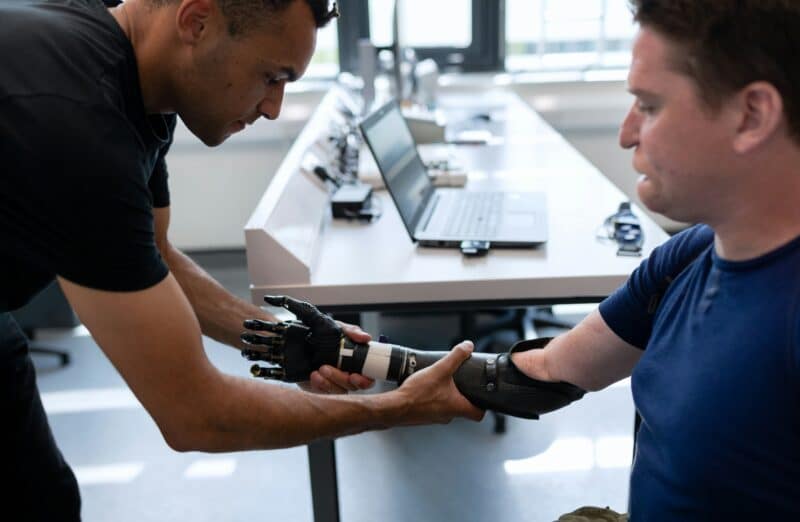
Prosthetists/orthotists
Prosthetists and orthotists are experts in designing and fitting devices that enhance mobility and improve quality of life for individuals with physical challenges. Prosthetists focus on creating artificial limbs (prosthetics) for patients who have lost limbs due to injury, illness, or congenital conditions. Orthotists specialise in providing orthotic devices, such as braces or splints, to support weakened muscles, correct deformities, or alleviate pain.
These professionals work in hospitals, rehabilitation centres, and private practices, often collaborating with surgeons, physiotherapists, and occupational therapists. Using a combination of engineering, biomechanics, and patient care, prosthetists and orthotists assess each individual’s needs and customise devices to ensure optimal comfort and functionality. Their work empowers patients to regain independence and confidence, transforming lives through innovative solutions.
Working as a prosthetist or orthotist is ideal for those who enjoy combining technical knowledge with creativity and patient care. These roles involve assessing patients, designing and fitting devices, and providing ongoing support to ensure their effectiveness. Prosthetists and orthotists often work with people recovering from trauma or managing long-term conditions, requiring empathy and strong communication skills.
Attention to detail, problem-solving abilities, and a passion for helping others are key traits for success in this field. Whether crafting a prosthetic limb that enables someone to walk again or designing a brace that relieves pain, this career offers immense satisfaction. Prosthetists and orthotists make a lasting impact by helping patients achieve greater mobility and a better quality of life.

Art therapists
Art therapists use creative expression to support individuals dealing with mental health conditions, emotional difficulties, or physical health challenges. Through drawing, painting, sculpting, and other visual arts, they help clients explore feelings, develop coping strategies, and improve overall well-being. Art therapy can be particularly beneficial for individuals who struggle to express themselves verbally, including children, those with neurological conditions, and people recovering from trauma.
These professionals work in a range of settings, including hospitals, mental health facilities, schools, rehabilitation centres, and private practice. They collaborate closely with psychologists, social workers, and healthcare teams to tailor interventions that meet the needs of each client. By fostering creativity and self-expression, art therapists provide a powerful means for emotional healing and personal growth.
A career as an art therapist is ideal for those who have a passion for both creativity and helping others. This role requires empathy, patience, and strong communication skills, as therapists work with individuals experiencing significant emotional distress.
Art therapists must be able to adapt their approach to suit different client needs, making flexibility and problem-solving key attributes. For those who believe in the power of creative expression as a tool for healing, this career offers a unique and rewarding way to make a difference in people’s lives.

Music and drama therapists
Music and drama therapists use performance and sound to support individuals with emotional, cognitive, or physical challenges. Music therapists harness rhythm, melody, and harmony to promote communication, relaxation, and motor skills development, while drama therapists use role-play, storytelling, and improvisation to help clients process emotions and develop confidence.
These therapists work in hospitals, mental health settings, care homes, schools, and community centres, often collaborating with multidisciplinary teams to deliver holistic care. Their work is particularly beneficial for individuals with conditions such as autism, dementia, or brain injuries, as well as those recovering from trauma or struggling with mental health conditions.
A career as a music or drama therapist is perfect for those who are creative, compassionate, and skilled in performance or musicality. These roles require strong interpersonal skills, patience, and the ability to adapt techniques to suit each client’s needs.
For those who find joy in using music or drama to inspire confidence and communication, this career provides deeply fulfilling opportunities. Whether helping a child with autism engage through song or supporting an elderly person in recalling memories through storytelling, music and drama therapists make a lasting impact on emotional and cognitive well-being.

Orthoptists
Orthoptists are specialised eye care professionals who diagnose and manage disorders of eye movement and visual development. They play a crucial role in assessing and treating conditions such as lazy eye (amblyopia), squints (strabismus), and double vision, working with both children and adults to improve vision and coordination.
Typically working in hospitals, community clinics, and specialist eye units, orthoptists collaborate with ophthalmologists and optometrists to develop treatment plans. Their expertise helps patients regain or enhance their visual function, often using corrective exercises, vision therapy, or eye patches to support rehabilitation.
A career as an orthoptist is ideal for individuals with an interest in anatomy, problem-solving, and working closely with patients. Attention to detail, strong communication skills, and the ability to reassure and engage patients—especially children—are key to success in this field.
For those passionate about vision and improving quality of life, orthoptics provides a rewarding healthcare career. Whether diagnosing vision problems early in a child’s development or helping stroke patients regain eye coordination, orthoptists play an essential role in eye health and function.

Paramedics
Paramedics are highly trained emergency responders who provide life-saving medical care in critical situations. As the first point of contact for patients in urgent need, they assess, stabilise, and transport individuals experiencing serious illnesses or injuries, often working in high-pressure environments.
Working in ambulance services, rapid response teams, and air ambulances, paramedics administer emergency treatments such as defibrillation, airway management, and drug therapy. They collaborate with hospital teams to ensure seamless patient care from emergency scenes to specialist treatment units.
A career as a paramedic is perfect for those who excel in high-energy, unpredictable environments and enjoy making quick, critical decisions. This role requires resilience, problem-solving abilities, and the capacity to remain calm under pressure.
Paramedics must be physically fit, highly skilled in emergency care, and able to offer reassurance to patients and families in distress. For those who thrive on variety and the satisfaction of saving lives, paramedicine offers one of the most dynamic and impactful careers in healthcare.

Operating department practitioners (ODPs)
Operating department practitioners (ODPs) are key members of surgical teams, ensuring the smooth running of operations and supporting patients before, during, and after surgery. They work alongside anaesthetists, surgeons, and nurses to maintain a sterile environment and assist with surgical procedures.
ODPs are responsible for preparing equipment, monitoring patients during surgery, and providing post-operative care. They play a vital role in ensuring patient safety, from administering anaesthesia support to handling surgical instruments in critical moments.
A career as an ODP is ideal for individuals who are detail-oriented, thrive in high-pressure environments, and enjoy working as part of a team. This role demands strong technical skills, quick thinking, and a commitment to patient care and safety.
For those who want to be at the heart of surgical procedures and play a critical role in patient outcomes, operating department practice provides a fulfilling and fast-paced career within healthcare.
Check out the different roles below:
Are you curious about where your skills might fit in this vital sector? Click on the cards below to explore specific roles and find out how you can contribute to the world of allied health care.

Management and general operations roles in allied health
Leadership and management roles in the allied health professionals sector ensure that teams are well-supported, resources are efficiently allocated, and services meet the highest standards of care. These roles involve strategic planning, operational oversight, and staff development, ensuring that both patients and professionals have the tools they need to thrive.
Key roles: Service managers, clinical directors, department heads, team leaders, practice managers, therapy leads, rehabilitation managers
Skills & attributes: Leadership, strategic thinking, operational management, financial planning, excellent communication, and the ability to inspire and motivate diverse teams.
These roles are ideal for those who: Thrive on responsibility, enjoy problem-solving, and have a passion for creating solutions that improve both patient care and workplace efficiency.
Scorecard
Salary Potential*
Flexible Hours
Flexible Location
Physicality
*based on a 40-hour working week

Clinical roles in allied health
Clinical roles are at the heart of allied health professionals, involving direct patient care to diagnose, treat, and manage a wide range of conditions from injuries to independent living, communication and swallowing difficulties, mobility and dietary issues. Clinicians work across diverse settings, from hospitals and private practices to community clinics and patients’ homes, often as part of multidisciplinary teams.
Key roles: Physiotherapists, occupational therapists, radiographers, speech and language therapists, podiatrists, dietitians, prosthetists, orthotists, art therapists, music therapists, drama therapists, paramedics, operating department practitioners
Skills & attributes: Strong clinical knowledge (with relevant qualifications), empathy, problem-solving, attention to detail, teamwork, and the ability to stay calm under pressure.
These roles are ideal for those who: Are passionate about improving health outcomes and thrive in dynamic environments where every day brings new challenges.
Scorecard
Salary Potential*
Flexible Hours
Flexible Location
Physicality
*based on a 40-hour working week

Diagnostic and laboratory roles in allied health
These roles focus on analysing samples and interpreting data to diagnose conditions and guide treatment plans. Diagnostic professionals work behind the scenes but are critical to patient care and medical decision-making.
Key roles: Pathologists, phlebotomists, clinical scientists, biomedical scientists, orthoptists
Skills & attributes: Analytical thinking, precision, problem-solving, attention to detail, and an aptitude for technology.
These roles are ideal for those who: Enjoy scientific inquiry and want to contribute to patient care in a non-patient-facing capacity.
Scorecard
Salary Potential*
Flexible Hours
Flexible Location
Physicality
*based on a 40-hour working week
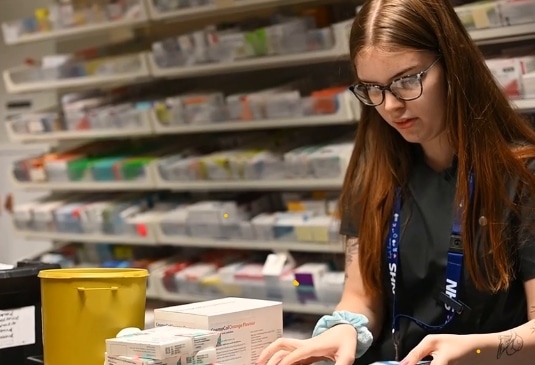
Non-clinical support roles in allied health
Non-clinical roles provide vital operational and patient support, enabling clinical staff to focus on delivering care. These roles vary from assisting medical teams with patient preparation to managing the flow of services and treatment plans.
Key roles: Healthcare assistants, dispensing assistants, rehabilitation support workers, therapy assistants, emergency care assistants
Skills & attributes: Compassion, organisational skills, attention to detail, and the ability to work as part of a team.
These roles are perfect for those who: Want to work closely with patients in a supportive capacity without needing extensive clinical qualifications.
Scorecard
Salary Potential*
Flexible Hours
Flexible Location
Physicality
*based on a 40-hour working week
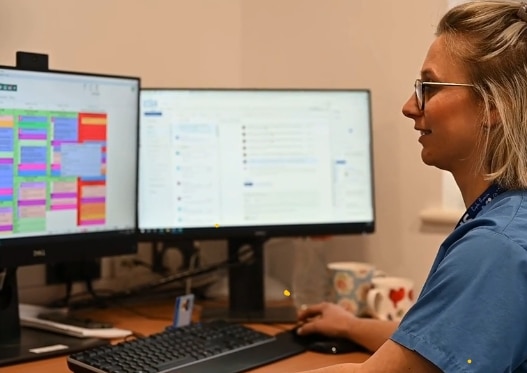
Administrative and operative roles in allied health
Administrative roles ensure the smooth running of allied health services, from managing appointments, patient interactions, and medical records to organising schedules, resources, and equipment.
Key roles: Receptionists, medical secretaries, service coordinators, health records officers
Skills & attributes: Excellent organisational skills, IT proficiency, customer service abilities, and attention to detail.
These roles are ideal for those who: Thrive in structured environments and enjoy working behind the scenes to support patient care.
Scorecard
Salary Potential*
Flexible Hours
Flexible Location
Physicality
*based on a 40-hour working week
These roles are essential to the effective functioning of allied health services. In addition to these direct roles, the sector also relies on key business functions such as IT, HR, and procurement. For more information on these departments and the roles they offer, click here to explore further.
For information on local courses and qualifications that could support your career in this field, please click here.

